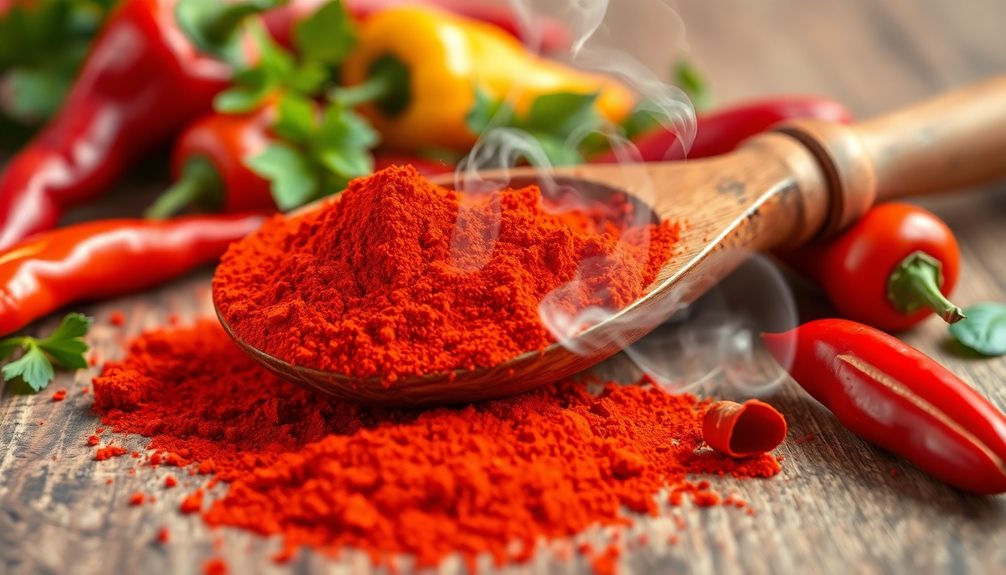Sweat itself doesn't have a smell; it's odorless. However, when it mixes with bacteria on your skin, it can create different scents, like sour or tangy. Factors like what you eat, your hormones, and even your emotions can change your body's odor. Foods rich in sulfur or spices can make your sweat smell stronger. Also, when you're stressed or exercising, your sweat can smell more intense. It's important to stay clean and wear breathable fabrics to keep odors at bay. If you pay attention to what your body tells you, you'll discover more interesting facts about sweat!
Key Takeaways
- Sweat itself is odorless; distinctive smells arise from bacteria breaking down apocrine sweat on the skin.
- Common sweat odors can range from sour and tangy to onion-like, influenced by diet and hygiene.
- Hormonal changes, such as those during puberty or menopause, can significantly alter sweat odor.
- Stress activates apocrine glands, resulting in a stronger body odor due to increased sweat production.
- Medical conditions like diabetes may cause fruity or sweet-smelling sweat, indicating potential health issues.
Introduction

When you think about sweat, you might picture the aftermath of an intense workout or a hot day. Sweat's your body's natural way to cool off, and it's mostly just water—surprising, right? The real story behind sweat, though, is how it interacts with bacteria on your skin. While sweat itself is odorless, when it mixes with these bacteria, that's when distinct odors can appear.
You've got two main types of sweat glands: eccrine and apocrine. Eccrine glands produce non-smelly sweat, which helps you cool down. On the other hand, apocrine glands, found in places like your armpits, create thicker sweat that can have a stronger odor.
Did you know that what you eat, your hormones, and even your genes can change how your sweat smells? Some people might notice their sweat has a sweet, sour, or even onion-like scent!
Plus, certain medical conditions can lead to unusual or particularly strong odors, signaling that it's time to check in with a doctor. Understanding sweat and odor helps you feel more confident and healthy!
Description of the Smell

The smell of sweat can vary widely from person to person, influenced by a mix of factors. Generally, sweat itself doesn't have a smell. However, when it interacts with the bacteria on your skin, it can create different scents. You might notice sour, tangy, or even onion-like odors.
Your diet plays a big role in how your body odor smells. For instance, if you eat foods high in sulfur, like garlic or onions, your sweat can develop a stronger scent due to the compounds released.
Hormonal changes, such as those during puberty or menopause, can also make your body odor smell different or stronger.
Additionally, some medical conditions, like diabetes, can produce unusual smells in your sweat, such as fruity or sweet scents, which might indicate the presence of ketones in your body.
Source and Composition

The real change in odor happens when bacteria on your skin break down the components of apocrine sweat. This process can create various smells, like sour, tangy, or even onion-like scents!
Your diet can also affect how your sweat smells. For instance, eating foods high in sulfur or spicy dishes can lead to stronger odors when your body metabolizes them.
Additionally, factors like hormonal changes, stress, and certain medical conditions can alter your sweat's composition. This means that what you eat and how you feel can impact how your sweat smells.
Typical Scenarios or Environments

In various environments, sweat interacts with bacteria on your skin, leading to a spectrum of odors. You might notice different sweat odor experiences depending on where you are. For instance, if you're at the gym or outside on a hot day, the humidity and physical activity can ramp up the smell. The bacteria on your skin thrive in those conditions, creating sour or tangy aromas that can be quite strong.
Certain foods you eat, like garlic and onions, can also change your sweat odor. After enjoying a tasty meal, you may notice a more pungent scent.
Plus, stress can make things worse! When you're stressed, your apocrine glands produce sweat that often smells more intense.
The clothes you wear matter too. Non-breathable fabrics can trap moisture and skin bacteria, leading to a stronger scent, especially in poorly ventilated environments.
Emotional or Cultural Associations

Sweat can evoke a range of emotional and cultural reactions that shape how we perceive its odor. While sweat itself is odorless, your emotional state can influence how it smells. For example, stress or anxiety can lead to more sweating, which bacteria can break down, creating a body odor that some might find unpleasant.
Cultural beliefs also play a big role in how we react to sweat. In some cultures, a strong body odor might be viewed negatively, linking it to poor hygiene. This can affect your personal and professional relationships. On the flip side, some cultures embrace natural scents and see them as a part of life.
Certain emotions, like fear or excitement, can make your sweat smell different, perhaps musky or sharp. This unique scent might signal distress or thrill to those around you.
Interestingly, research shows that people can detect these emotions through sweat. So next time you sweat, remember that it's not just about the physical; it's a blend of your feelings and cultural attitudes that shape the way others perceive you!
Health or Safety Considerations

Many people mightn't realize that while sweat is naturally odorless, it can develop a distinct smell due to its interaction with skin bacteria. This process can lead to body odor, especially in areas with lots of sweat glands, like your armpits or groin.
It's important to understand that factors like your diet, hormonal changes, and even certain medical conditions can influence the scent of your sweat. For example, the risk of certain health issues, such as breast cancer, can increase with age and hormonal changes, making awareness of body changes essential for early detection breast cancer risk factors.
For instance, if you notice a fruity smell, it might be linked to high ketones, often seen in diabetes. Similarly, an ammonia-like scent could indicate metabolic issues. If you experience excessive sweating or sudden changes in body odor, it's wise to consult a healthcare provider.
Poor hygiene can also make body odor worse, as bacteria love to thrive on sweaty skin. Regularly washing with antibacterial soap is essential for keeping odor at bay.
Final Thoughts

Understanding the nuances of sweat and its odors can empower you to take control of your body's hygiene and health. While sweat itself doesn't have a smell, it can develop various odors when it interacts with the bacteria on your skin. Knowing this, you can take steps to manage your body odor effectively.
First, be mindful of what you eat. Foods high in sulfur, like garlic and onions, can make your sweat smell stronger. Staying hydrated and maintaining a balanced diet can help reduce unpleasant scents. Additionally, try incorporating more fresh fruits and vegetables into your diet, as they can contribute to a cleaner, more subtle body odor. The scent you carry is often influenced by your lifestyle choices, much like how the scent profile of Glossier You adapts to the wearer’s unique skin chemistry. By paying attention to diet and hydration, you can better manage the natural aromas your body creates.
Next, consider your emotional state. Stress and anxiety can increase sweating, leading to more noticeable body odor. Finding ways to relax, like deep breathing or yoga, can help.
Finally, your hygiene practices are crucial. Regularly washing your body with antibacterial soap can significantly reduce the odor produced by sweat.
Make it a habit to shower daily, especially after exercising.
Frequently Asked Questions
How Would You Describe the Smell of Sweat?
When you think about sweat, you might notice it can smell different based on various factors. Sometimes it's tangy or sour, while other times it might have a sweet or onion-like scent, depending on you.
Is It Normal to Smell Your Own Sweat?
Yes, it's normal to smell your own sweat. You become accustomed to your body's natural scents, especially after exercising or in heat. Factors like hygiene, diet, and health can influence how you perceive that smell.
Is the Smell of Sweat Attractive?
The smell of sweat can be attractive to some people, as it carries pheromones that might influence your social interactions. Individual preferences vary, shaped by genetics, diet, and personal experiences, making attraction quite subjective.
How Do You Know if You Smell Bad to Others?
You can know if you smell bad to others by paying attention to their reactions, seeking honest feedback from friends, or monitoring your hygiene habits. Regular washing and using deodorant can help keep odors at bay.









